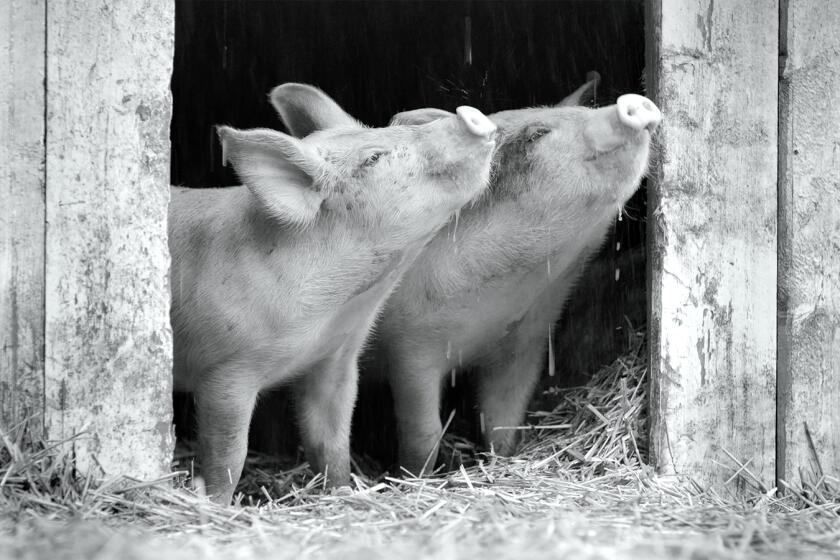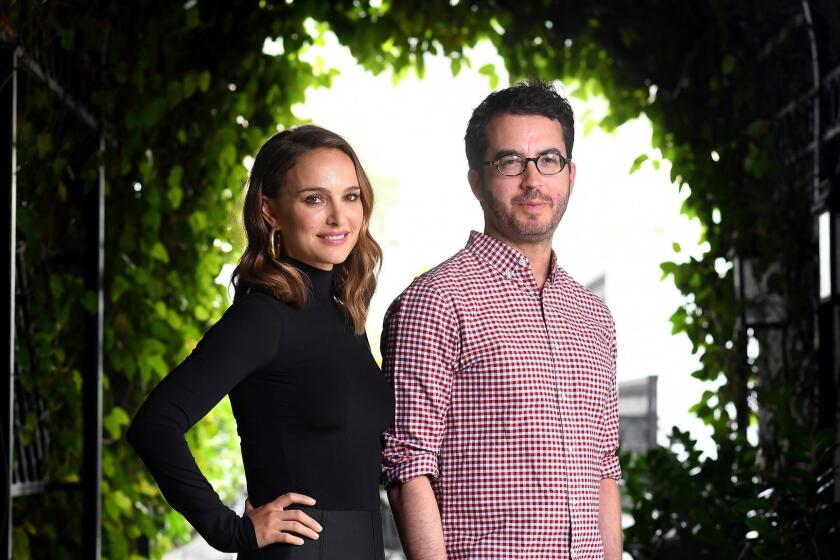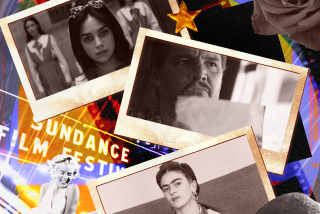Joaquin Phoenix explains why ‘Gunda’ isn’t vegan propaganda. It’s ‘just facts’
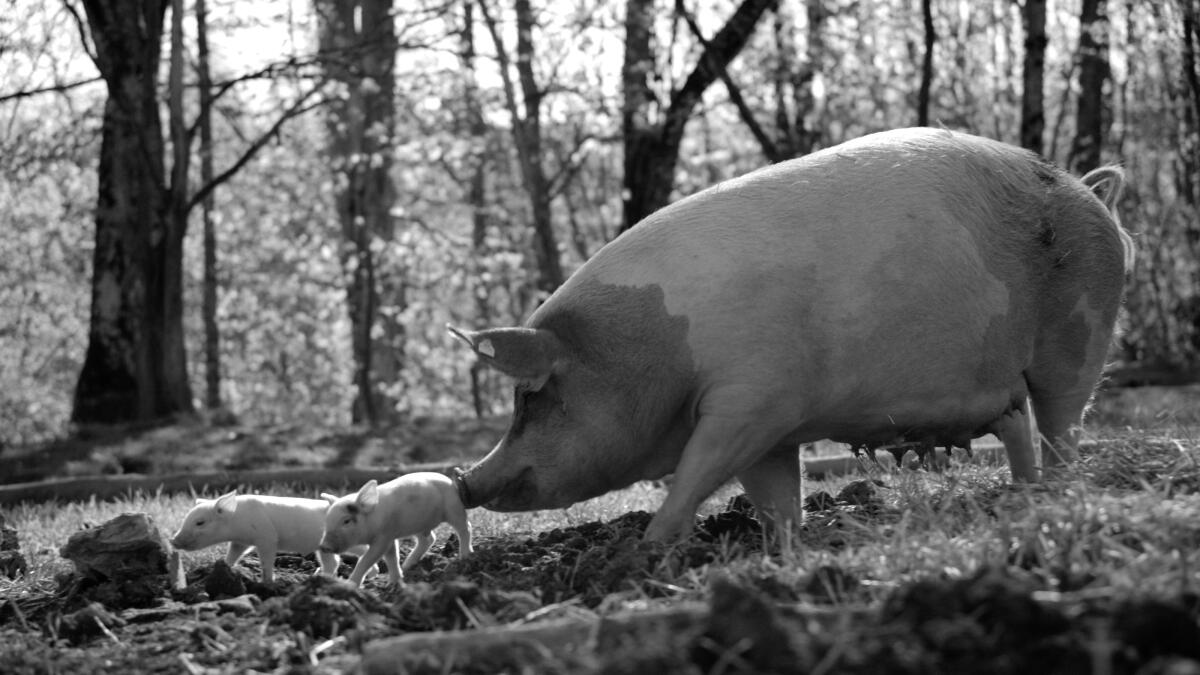
As he made his way through the pre-pandemic awards season last year, picking up trophies for his performance in “Joker,” actor Joaquin Phoenix gave an increasingly powerful series of speeches.
Phoenix seemed to recognize the influence of the platform he was being given on some of the world’s most celebrated stages, and he made the most of it with a string of moving and emotional statements — addressing representation and inclusion at the BAFTAs and conveying a moving message at the Oscars for animal rights.
Filmmaker Victor Kossakovsky did not see Phoenix’s speech that night, but almost immediately his phone began ringing with friends and collaborators telling him Phoenix’s message was the same as that of his latest documentary, “Gunda.”
Kossakovsky’s producer got the film to Phoenix, who signed on as an executive producer. In the film, which is now playing in theaters in Los Angeles, New York and San Francisco, there are no subtitles, no voiceover, not even music, just elegant black-and-white images of animals living their lives. A chicken raised in a cage touches grass for the first time, a herd of cows is released into a field, and a pig named Gunda, on a farm in Norway, tends to her litter of piglets, nurturing them, caring for them, showing them love, making tough decisions and exhibiting deep anguish when tragedy strikes.
Phoenix and Kossakovsky have still never met in person due to the pandemic, but the pair recently got on a conference call together — the Russian-born Kossakovsky from where he lives in Berlin and Phoenix from his home in Los Angeles. In conversation they make for a lively contrast, as Kossakovsky is given to expansive, slightly rambling explanations that often start one place and go somewhere quite different, while Phoenix speaks passionately in sharp, focused bursts.
Victor Kossakovsky’s gorgeous, wordless, black-and-white documentary “Gunda” depicts the world of a sow, her piglets and their barnyard world.
I’ve never experienced a film the way that that I’ve experienced ‘Gunda.’
— Joaquin Phoenix
For Phoenix, adding his name and lending his time to “Gunda” seems to be drawn from the same impulse behind his intentional use of his awards season spotlight. If he often seems wary of the public eye, he is nevertheless going to make the most of it to bring attention to issues he cares about.
“I’m not sure about that,” Phoenix said when presented with the idea connecting his awards run to his animal rights activism and support of the film. “I think with ‘Gunda’ it was just recognizing this incredible creative endeavor that was powerful both in its cinematic qualities and also in what it was saying.
“I’ve never experienced a film the way that I’ve experienced ‘Gunda,’” said Phoenix. “And so I automatically felt like this was something that I wanted to get behind. It was just an honest reaction to something that I’d witnessed. That’s as much as I thought about it. I saw this film, I was struck by it, I’d never seen anything like it and so I was honored to support it in whatever way.”
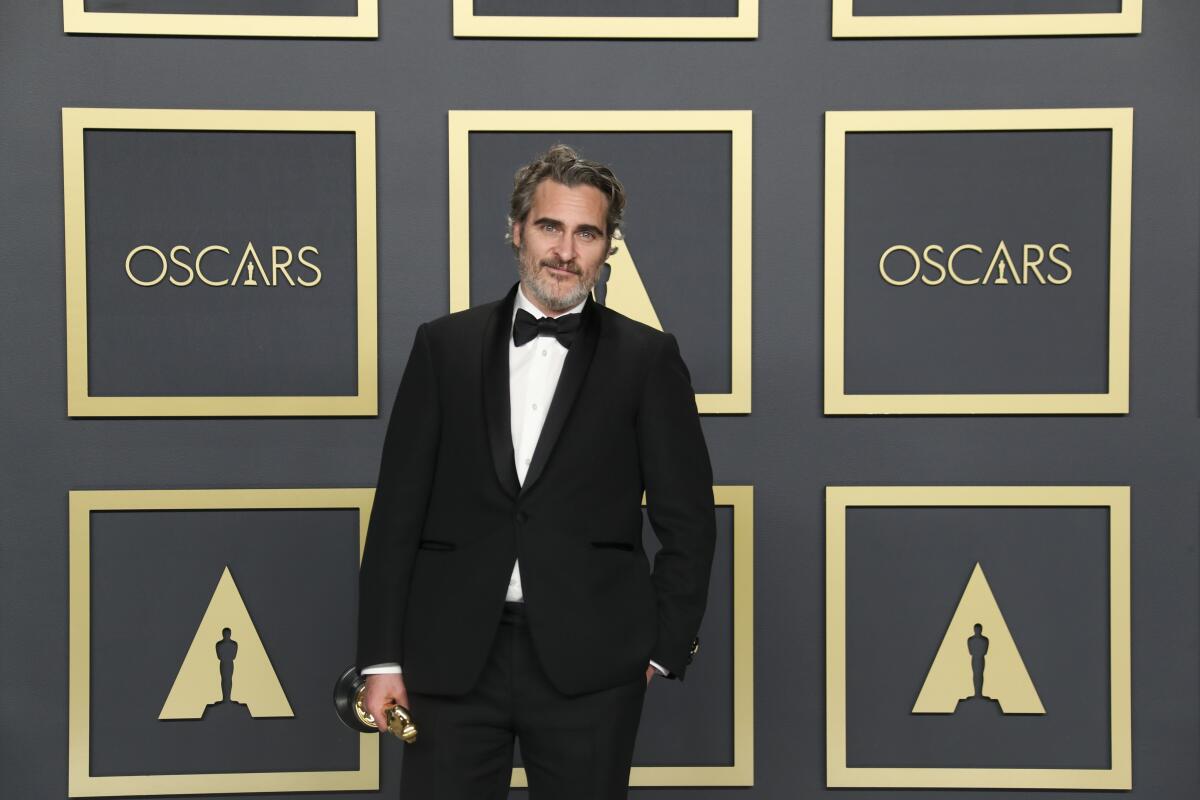
Kossakovsky is a veteran documentary filmmaker whose previous film “Aquarela,” like “Gunda,” made the shortlist for the Academy Award for documentary feature. He also edited “Gunda” and photographed the film, alongside cinematographer Egil Håskjold Larsen, after struggling for more than 20 years to raise the financing.
In a published director’s note, Kossakovsky stated, “I have always wanted to make a film about the creatures with whom we share the earth, a film about animals as living, feeling beings in their own right. I wanted to make a film without patronizing or humanizing them, without any sentimentality, and without vegan propaganda.”
Both the filmmaker and his new supporter are committed vegans, but Kossakovsky explained what he meant by “vegan propaganda.”
“It’s easy to push emotion, especially with the ending I have, and if I put violins or cellos, music, something like that, of course, if I would make vegan propaganda, half the people would not watch it,” said Kossakovsky. “I am not a politician. I have no right to talk with people who share my opinions. This is politicians doing this. They are talking with people who share their ideas. I am an artist, I have to talk to everyone. Not only who lives now, who lives after me.
“If you go to a museum, you don’t want to see propaganda. You want to feel something you never feel before,” said Kossakovsky. “It’s not for a message — even if it will be very nice message you will be agreeing with. Museums are not for messages, museums are for great art. And cinema as well.”
[People] understand the value of their dogs or their cats. They understand that they have unique personalities and they share videos of them. But somehow there is a disconnect when it comes to our food. And it’s just because of what we’ve been indoctrinated with.
— Joaquin Phoenix
In talking about the film, Kossakovsky extols some of the overwhelming statistics on the sheer numbers of animals killed each year for food production around the world and the vast amount of natural resources consumed as part of that process. With the world population continuing to grow, those numbers also continue to climb.
“And that’s not vegan propaganda, that’s just facts,” interjected Phoenix.
“I understand Victor is an artist and he created this film to be experienced. But for me, there is a very strong message behind it,” said Phoenix. “For people to experience animals the way I think they do with their dog, they understand the value of their dogs or their cats. They understand that they have unique personalities and they share videos of them. But somehow there is a disconnect when it comes to our food. And it’s just because of what we’ve been indoctrinated with and what we’ve been taught. As Victor is saying, it has become completely out of proportion with what is sustainable.
“It’s not just a fringe group of people that are really soft and tree-huggers and they just care about everything. It’s just f— facts,” said Phoenix. “We’re destroying the world and our children, our grandchildren are going to pay for it. And I don’t think that we are aware of it, many people aren’t. And so it is absolutely, I think, one of the great issues that we are facing today that needs to be addressed because we are running out of time.”
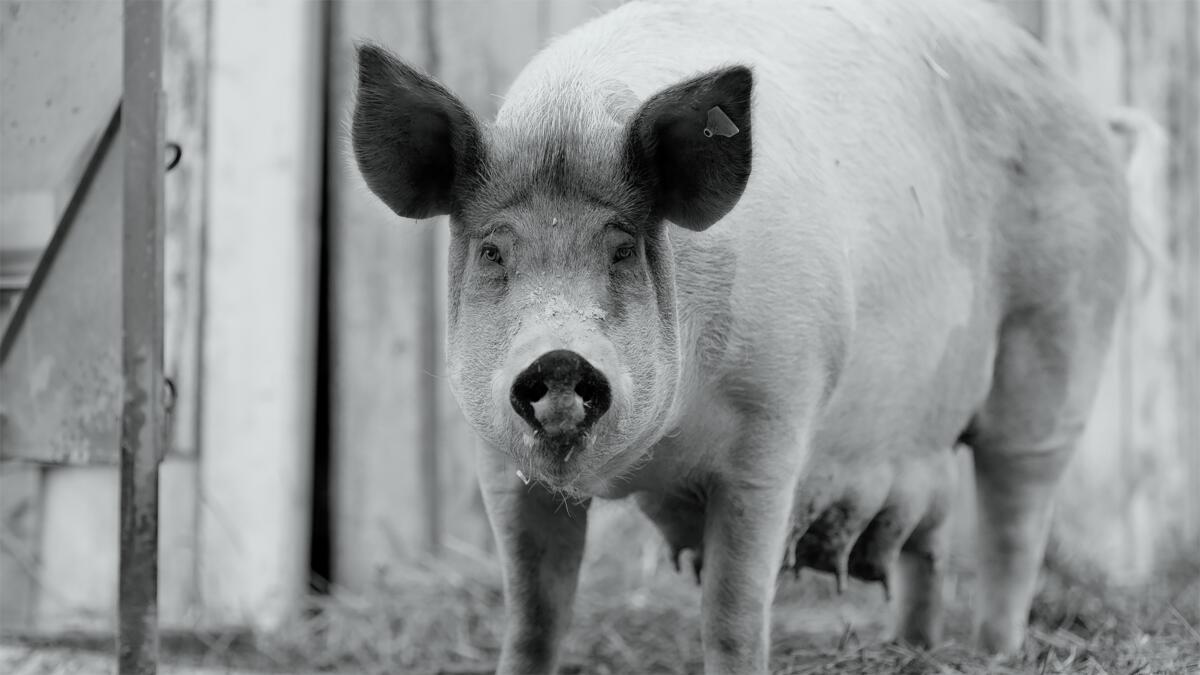
There was reported to be a recent rise in interest in veganism, whether for ethical, health or environmental reasons, along with an increased demand for plant-based meat alternatives. While the movie never makes any explicit overtures regarding veganism, the ideas behind its images of animal life are never far away.
“I think it’s great that people are becoming aware, but it really is a time for action,” said Phoenix, noting the vast amount of land used to raise livestock and how many gallons of water it takes to create a single pound of beef. “And I think that we hear those statistics sometimes, and it’s almost difficult to comprehend because the numbers are so vast, we’re talking about trillions of animals. And I understand that a lot of people don’t really have any moral qualms about killing an animal. And I get that. I mean, I don’t, but OK, fine.
“But I think that when your personal decisions are having such a detrimental impact on everybody’s environment and life, then it’s time for a real hardcore assessment of how we’re living our lives. And it’s going to require some sacrifice. Sometimes people say, ‘Well, I don’t feel I’m at my optimum health when I eat vegan.’ And honestly, I think I may be different than anyone else on this call, I say ‘f— off your optimum health,’ because we’re talking about just the bare minimum health of the planet so that we all survive.”
In the first minute, the first farm, we opened the door and Gunda just came to me. She was so friendly. And she looked at me, and it was immediately like talking to me.
— “Gunda” director Victor Kossakovsky
A question as to how he discovered the actual pig named Gunda that stars in the film leads Kossakovsky to tell a story about a family in South America he met while working on another project. They cared for a beaver as a pet. He then recalls how he had initially planned to do six months of research before starting production, beginning at a farm just outside of Oslo.
“In the first minute, the first farm, we opened the door and Gunda just came to me,” said Kossakovsky. “She was so friendly. And she looked at me, and it was immediately like talking to me. I said to my producer, ‘We don’t need to search.’ Producer said, ‘What has happened? We still have time.’ I said, ‘Look at her, she’s talking to us, she’s definitely talking to us.’
“Gunda actually chose me, not that I chose her,” said Kossakovsky. “There were many pigs there, but she came to me and she started looking to me, so friendly. So it was no other choice. We met for a purpose, for a reason.”
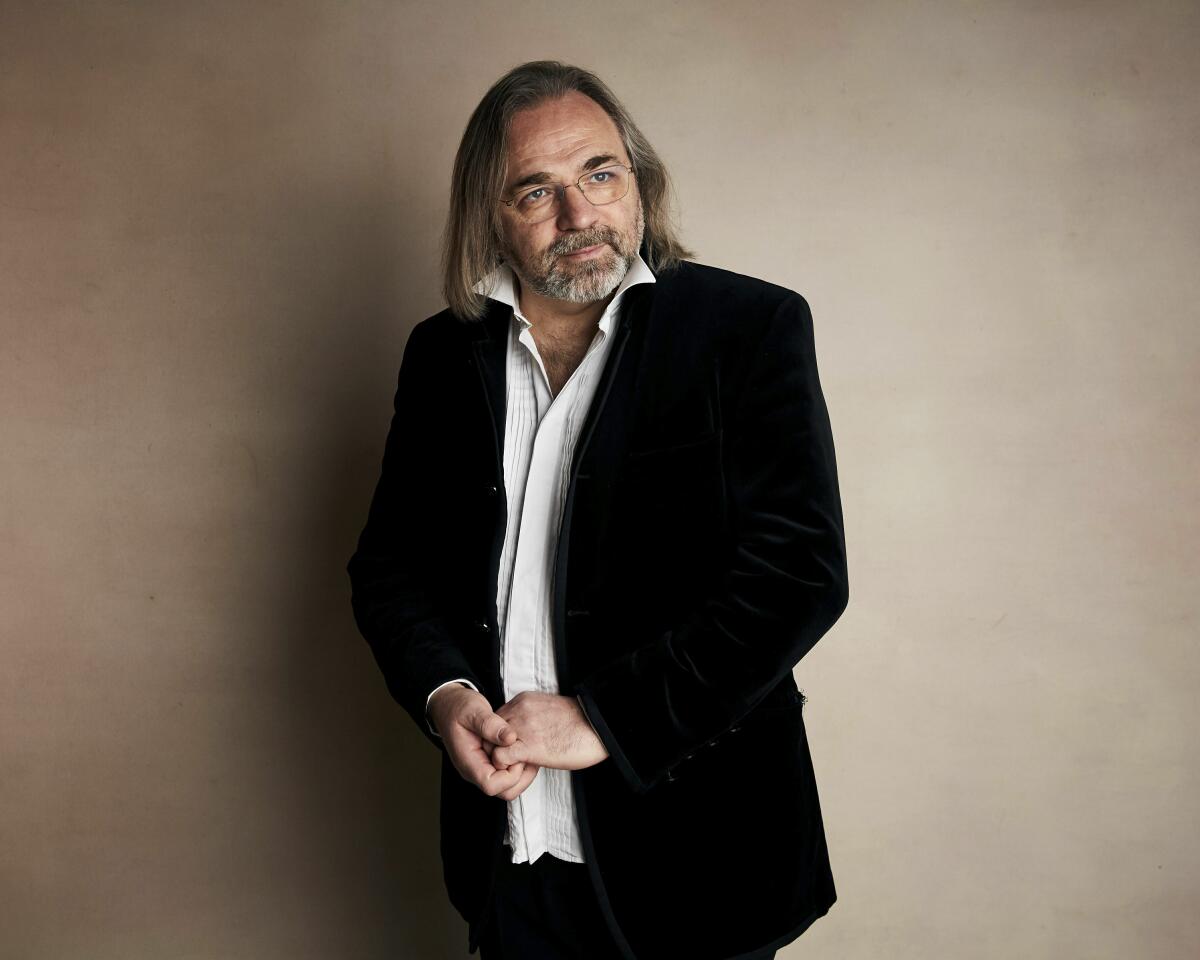
Kossakovsky and his collaborators built an enclosed pen with a small opening all the way around just large enough for the lens of the camera, so that Gunda could be observed uninterrupted with her young. A disco ball was actually used to light the space, giving a softly dappled effect.
“The first line I wrote in my short script about it was we have to film this with full respect and give them space if they need. Never push, never interact, never distract,” the filmmaker said of the style of the film. “So of course we have to be very tender and we have to just see what they feel and not destroy this. The same with any other subject, if it’s a pig or a cow or a human. If you come too close, too fast, you might destroy the atmosphere, you might destroy trust.”
Phoenix recalls watching nature documentaries from a young age and says he’s never seen anything quite like “Gunda” before. As much as he supports the message the movie is trying to convey, he also found the experience emotional and moving.
“Honestly I think what is unique about this is it really is, in my opinion, a work of art,” said Phoenix. “And it’s hard for me not to impose my opinions on people about this because I feel like it’s so important and we need to wake up to the reality of what we’re doing to animals and to the world. But I think that it is a film that allows the audience to have their own personal experience with these animals. And in many ways, I wouldn’t want to affect that. I would just encourage people to experience this film. It’s not what you expect. It’s not an animal rights film that you might be familiar with. It really is a powerful experience.”
Natalie Portman hasn’t eaten meat since she was nine years old.
More to Read
Only good movies
Get the Indie Focus newsletter, Mark Olsen's weekly guide to the world of cinema.
You may occasionally receive promotional content from the Los Angeles Times.
